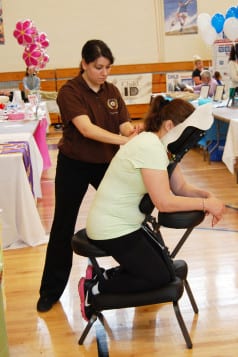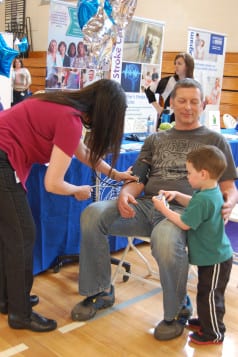As Long Islanders are warned about an uptick in Lyme disease, another tick-borne virus has emerged in Connecticut across the Long Island Sound.
Nearly 12 years ago, Eric Powers, a biologist and wildlife educator, noticed an increase in the tick population at Caleb Smith park in Smithtown, after pulling nearly 40 ticks off a group of his students.
Powers conducted a survey of the park and discovered the population of tick predators had decreased, as feral and outdoor house cats either chased them off or killed them.
“It’s becoming a huge nationwide issue with our wildlife,” Powers said during a phone interview. “Wherever people are letting their cats out, we’re seeing this disruption in ecosystem where these tick predators are gone.”
But what Powers did not find was the prevalence of a tick-borne virus, the Powassan virus, which recently appeared in Bridgeport and Branford in Connecticut.
Between 1971 and 2014, 20 cases of POW virus were reported in New York, according to the Cornell Cooperative Extension in Suffolk County. The Centers for Disease Control and Prevention reports the virus has been found in Maine, Massachusetts, Minnesota, New Hampshire, New Jersey, New York, Pennsylvania, Virginia and Wisconsin.
Like Lyme disease, the virus can cause long-term neurological problems if left untreated. But Long Island POW virus incidences remain low despite the increase in tick population, according to Daniel Gilrein, an entomologist at Cornell Cooperative Extension.
POW virus, which is related to the West Nile virus, was first identified in Powassan in Ontario, Canada, in 1958 after a young boy was bitten by an infected tick.
Little is known about how much the tick population has exactly increased on Long Island, but Tamson Yeh, pest management and turf specialist for the Cornell Cooperative Extension, said it is unlikely cats are contributing to the increase by eating tick predators like birds.
“Birds will eat ticks, but not all birds are insect eaters,” Yeh said in a phone interview.
She said the snow cover during the winter months served as insulation for the ticks hiding in the ground, which helped them survive during the colder weather.
Richard Kuri, president of R.J.K. Gardens, a St. James-based landscaping company, has not noticed an increase in tick population recently. Regardless, he and his men continue to wear long sleeves and use a variety of sprays to ward off bugs while on the job. Kuri also said people may use more natural remedies to deter ticks.
“There are people who apply peppermint oil and rosemary mix that will help,” Kuri said. “But none of them are cure-alls.”
He added that granular insecticides, like Dylox, help kill a variety of unwanted bugs including ticks carrying viruses like Powassan.
There are two strains of the virus, which are carried by woodchuck and deer ticks. Since only about 60 cases of POW virus were reported in the United States in the past 10 years, Yeh said the chance of encountering POW virus is unlikely since the virus is rare.
Symptoms of the virus include fever, headaches, vomiting, weakness, confusion, drowsiness, lethargy, partial paralysis, disorientation, loss of coordination, speech impairment, seizures, and memory loss. Other complications in infected hosts may possibly arise, such as encephalitis, inflammation of the brain and meningitis.
Powers said he hopes to reduce tick population on Long Island through his quail program. He encourages local teachers, who use chicks or ducklings to educate their students about the circle of life, to raise bobwhite quails. He said releasing these quails annually will not only help them adjust to the presence of cats, but also control the tick population.





















